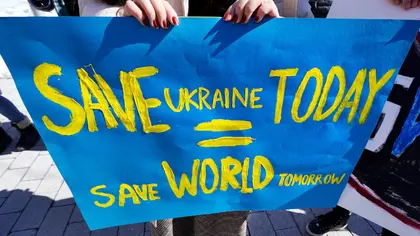Ukraine needs twice as much financial support this year as it has been promised so far, while only half of what has been promised has been disbursed.
Ukraine’s financial situation is becoming desperate. Its many allies have stepped up to help the country both with military and humanitarian assistance, but sadly it is not enough given the devastating warfare that Russia pursues against Ukraine and its economy.
JOIN US ON TELEGRAM
Follow our coverage of the war on the @Kyivpost_official.
The cost to Ukraine of the war is horrendous. Russia has now occupied one-fifth of Ukraine and has bombed a sizeable chunk of the rest. Ukraine expects a decline in GDP of 30-35 percent this year. That said, its international currency reserves have stayed surprisingly strong at $22.8 billion at the end of June, albeit declining. Ukraine has just been forced to devalue by 25 percent to 36.5 Hr.to the dollar, but the black-market exchange rate has touched 40 Hr. to the dollar. Ukraine’s Western partners have agreed to a standstill in the foreign debt service until the end of 2023, but this is not enough.
The Ukrainian government has repeatedly stated its need for about $5 billion a month in government financing since the start of the war. This amount does not include military support. At the Ukraine Recovery Conference in Lugano, July 4-5, the government asked for $60-65 billion for 2022. It declared that it had received pledges of about $30 billion, but on July 22 Kyrylo Shevchenko, the governor of the National Bank of Ukraine, stated that so far the country had only received $12.7 billion in actual disbursements.

Zelensky Meets CIA Director William Burns in Ukraine
Most of this funding has come from the U.S., which has committed $54 billion of both military and humanitarian assistance this year. Approximately half is military and half humanitarian, and it is disbursing steadily. The first package consisted of $14 billion and the second of $40 billion. The U.S. is currently working on a third package to be expected in early September of an as yet unknown size. All the U.S. money comprises grants, as should be the case. In short, the U.S. is doing as much as one could desire financially.
Unfortunately, the European Union has only disbursed a first package of €1.2 billion of macro-financial assistance. It has committed a second much larger package of €9 billion, but it has encountered (German) bureaucratic problems even disbursing €1 billion.
These problems are of an internal EU nature and the EU had better resolve them as fast as possible.
Traditionally, macro-financial assistance comes in the form of loans, but Ukraine cannot afford to accept more loans, because the debt burden will become excessive with reduced GDP and will force Ukraine into debt restructuring. Dragon Capital expects Ukraine’s debt-to-GDP to rise from 49 percent last year to 95 percent this year, which is far too high.
In addition, the EU has given a couple of billions in military assistance, and many EU countries are offering bilateral military and humanitarian assistance, but the totals are insufficient. The EU needs to disburse the committed macro-financial assistance of €9 billion as fast as possible and pledge more. In parallel, EU members should make their individual bilateral commitments of real financing now.
Ukraine’s Western allies also need to go after the culprit: Russia.
Russia ought to pay substantial war reparations to Ukraine. Fortunately, Russia does not need to agree, because the West has already frozen the international currency reserves of the Central Bank of Russia that are being held in Western countries. These funds are substantial and perfectly liquid, and they are the indisputable property of the Russian Federation.
According to the public statistics of the Central Bank of Russia, on Jan.1, these reserves amounted to $316 billion. Of these funds, Germany held $96 billion, France $61 billion, Japan $57 billion, the U.S. $39 billion, the U.K. $31 billion, Canada $17 billion, and Austria $15 billion.
All these countries should confiscate these funds through national legislation, since Russian President Vladimir Putin has committed crimes against humanity and an unprovoked war of aggression. The confiscation of these funds can be done fast and involve minimum administrative and legal work, but their confiscation must be legislated.
There is a good legal basis for this confiscation. On March 16, the top United Nations court, the International Court of Justice in The Hague, ruled by a vote of thirteen to two (latterly the Russian and Chinese justices), that Russia “shall immediately suspend the military operations that it commenced on 24 February.” Since Russia did nothing of the kind, the Western countries in question have good legal reasons to confiscate these Russian funds.
So, what should be done?
- The U.S. is continuing to lead and doing its part to keep Ukraine’s finances afloat. It is likely to continue its disbursements and will hopefully adopt a new package of Ukraine financing;
- The EU needs to get its act together and at least disburse what it has committed before Ukraine defaults;
- The Ukrainian government should make it a diplomatic top priority to convince its Western partners to confiscate the international currency reserves of the Central Bank of Russia and deploy them to Ukraine as Russian war reparations.
Anders Åslund is a Senior Fellow at the Stockholm Free World Forum. His latest book is “Russia’s Crony Capitalism: The Path from Market Economy to Kleptocracy.”
The views expressed in this article are the author’s and not necessarily those of the Kyiv Post.
You can also highlight the text and press Ctrl + Enter






